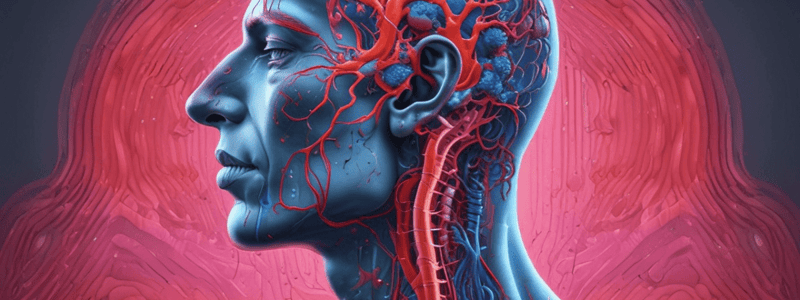Podcast
Questions and Answers
What primary hormone drives male sexual arousal physiologically?
What primary hormone drives male sexual arousal physiologically?
- Estrogen
- Dihydrotestosterone
- Testosterone (correct)
- Estradiol
Which hormone is more prominent in female sexual response compared to male sexual arousal?
Which hormone is more prominent in female sexual response compared to male sexual arousal?
- Dihydrotestosterone
- Estrogen (correct)
- Estradiol
- Testosterone
What role do estradiol and testosterone therapy play in the time taken for penile erections during copulation?
What role do estradiol and testosterone therapy play in the time taken for penile erections during copulation?
- Increase the time taken
- Have no effect
- Stabilize the time taken
- Decrease the time taken (correct)
Which type of erection depends on androgens like dihydrotestosterone or testosterone?
Which type of erection depends on androgens like dihydrotestosterone or testosterone?
Understanding the nuances of male arousal differences can help improve our knowledge of ____________.
Understanding the nuances of male arousal differences can help improve our knowledge of ____________.
Why is comprehending the sexual response cycle essential in understanding arousal in males?
Why is comprehending the sexual response cycle essential in understanding arousal in males?
What are the stages of the male sexual response cycle?
What are the stages of the male sexual response cycle?
Which stage is characterized by the release of seminal fluid from the penis?
Which stage is characterized by the release of seminal fluid from the penis?
What role do cognitive frameworks play in male arousal?
What role do cognitive frameworks play in male arousal?
In which gender do individuals generally show a greater correlation between physiological and subjective arousal according to research?
In which gender do individuals generally show a greater correlation between physiological and subjective arousal according to research?
Study Notes
Male arousal is a complex physiological and psychological process involving various hormonal, neurological, and environmental factors. Understanding the nuances of male arousal differences can help improve our knowledge of sexual health and enhance relationships. Here we delve into the subtopics of physiological differences, sexual response cycle, and psychology to explore the intricacies of male arousal.
Physiological Differences
Physiologically, male sexual arousal is primarily driven by testosterone levels and the autonomic nervous system (ANS). Testosterone plays a crucial role in the development and maintenance of secondary sex characteristics, including sexual desire and erectile function. Contrastingly, estrogen seems to play a more prominent role in female sexual response.
Another factor influencing male arousal is the time taken for penile erections following the introduction of the female partner. Studies have shown that this process may depend on several hormonal factors, including estradiol and testosterone therapy in the case of copulation, while touch-based erection depends on androgens like dihydrotestosterone or testosterone. These complex differences highlight the unique physiology underlying male arousal.
Sexual Response Cycle
Understanding the sexual response cycle in males is essential for comprehending how arousal manifests in this population. While females typically exhibit four stages - excitement, plateau, orgasm, and resolution - the male sexual response progresses through three main stages: excitement, ejaculation, and refractory period. During the excitement stage, blood flow increases to the penis, leading to an erection. Once an erection is achieved, the individual moves into the ejaculation phase, characterized by the release of seminal fluid from the penis. Finally, after ejaculation, a refractory period ensues, during which no further erections can occur until sufficient time has passed.
Psychological Factors
Psychological components greatly influence male arousal, shaping both subjective experiences and physiological responses to sexual stimuli. Cognitive processing, including memory, attention, and emotion, sets the internal context for interpreting visual sexual stimuli. Furthermore, cognitive frameworks, such as affective state, previous experience, and current social context, mediate the production of peripheral physiological reactions, creating a feedback loop that ultimately impacts feelings of sexual arousal.
Moreover, research has uncovered significant differences in how men and women respond to sexual stimuli. Men generally show a greater correlation between physiological and subjective arousal, whereas women exhibit low or absent correlations between these two aspects. Understanding these psychological differences can inform approaches to treating female sexual dysfunction and help researchers explore fundamental questions about the nature of sexual motivation and arousal.
Studying That Suits You
Use AI to generate personalized quizzes and flashcards to suit your learning preferences.
Description
Explore the complexities of male arousal through physiological differences driven by testosterone levels, the sexual response cycle comprising excitement, ejaculation, and refractory period, and the psychological factors influencing subjective experiences and physiological responses to sexual stimuli.




